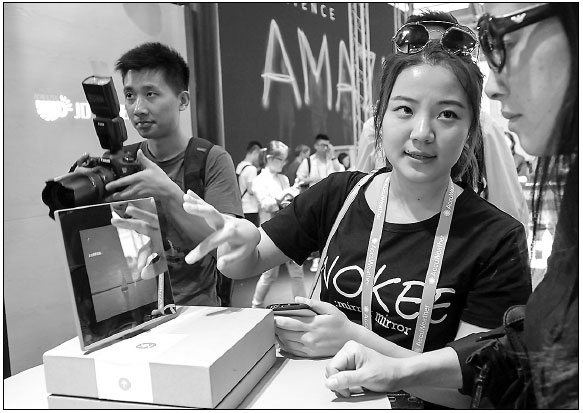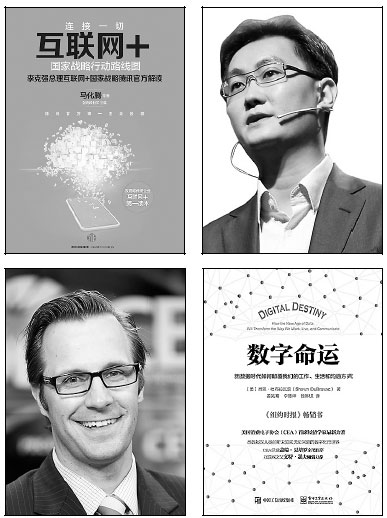Digital heads-up
Updated: 2015-05-27 07:20
By Xing Yi(China Daily USA)
|
||||||||
Two new books in China are telling readers what to expect from an Internet Plus future, Xing Yi reports.
Two new books in China are telling readers how the Internet and technology have changed the daily life and what to expect in the future.
Internet Plus: the Roadmap for the National Strategy, written by Pony Ma Huateng, the CEO of Chinese IT giant Tencent, and other experts, is seen as the company's interpretation of the government's digital roadmap. The book tells readers how technological developments will upgrade traditional industries.
The Internet Plus policy was officially spelled out in this year's government report by Premier Li Keqiang during the National People's Congress session in March - to integrate mobile Internet, cloud computing, big data and the Internet of Things with modern manufacturing to encourage the country's e-commerce boom.
While Ma's book, launched on Friday, emphasizes connection and the reshaping of businesses by the Internet, the Chinese edition of Digital Destiny, written by Shawn DuBravac and launched during the Consumer Electronics Exhibition Asia on Monday in Shanghai, takes readers on a tour of the digital future.
"Connection is the foundation and opens all possibilities," Ma writes in the preface of his book. "The Internet is just like electricity and it will inject new DNA into all industries to let them be born anew."
The book explains the concept and features of Internet Plus. A coauthor of the book and joint chairman of the China Value Association, Zhang Xiaofeng, describes it as a "crossover, merger and all-connecting" platform.
The book delves into how the Internet helps upgrade different areas of traditional industries in China.
Established examples include: Baidu, the search engine and online advertisement platform; Taobao, an online marketplace; Alipay, a third-party payment service that uses traditional banks for transactions over the Web.
In April, Tencent signed an agreement with the Shanghai municipal government to have the company's instant messaging app WeChat used by people to make appointments for passport registration, paying utility bills and checking traffic violations.
According to DuBravac, the author of Digital Destiny, very few things are digitized in today's world. "But they could be digitized - our chairs could be digital, our carpet could be digital and our lights could be digital," says DuBravac, who is the chief economist for US-based Consumer Electronics Association, while speaking at the Shanghai exhibition.
"It all involves putting sensors to collect data and using them in a smart way," DuBravac says. "But connection and digitization serve the same goal ... If I digitize the chairs in a lecture hall and connect them, then the organizer would know how many people have come to the lecture. If I just digitize the chair but it does not connect to anything, then it's not helpful."
In the book, DuBravac recalls an incident from his childhood, when his mother fell asleep at the wheel and their car veered off the road. Though no one was injured, the memory lingered.
He wrote that driverless cars would be the answer to such worries as more prototypes of such automobiles were being tested.
The question isn't if there will be one, but when and where, he writes.
DuBravac believes that in the next 10 years, people will experiment with digitizing to connect different objects and start to look at user-case scenarios.
"The snow trucks that move snow from the road are GPS-enabled, and I can look up on the website or my mobile phone to locate the snow truck and figure out when I will be able to leave my home," he says.
Both books talk about the relationship between old and new industries.
"The relationship between the Internet and other industries is not replacement but plus (adding value)," Ma writes in his book. "Different trades have their own industrial bases and many of them cannot be replaced by the Internet."
DuBravac says: "It will be disruption, but ultimately it will create more employment.
"Since my first visit to China in 2004, I have noticed Chinese companies becoming more sophisticated and global-minded ... The technology has improved so significantly, and there are so many well-educated and smart people to compete globally."
Contact the writer at xingyi@chinadaily.com.cn
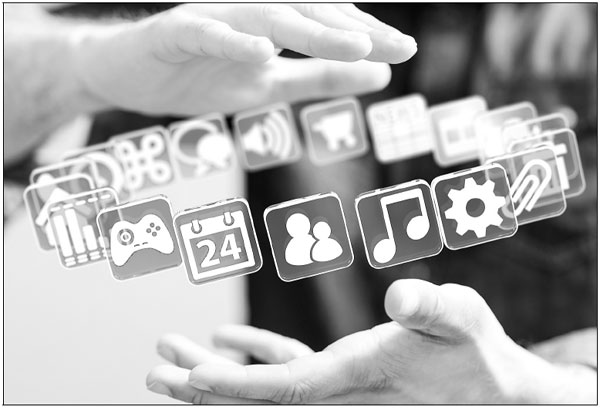
|
New products on display at the Consumer Electronics Exhibition Asia draw a big crowd in Shanghai. The trade fair, opening on Monday, offers a glimpse into the changing lifestyle with the development of technology.Provided to China Daily |
|
Two new books - Internet Plus: the Roadmap for the National Strategy by Pony Ma Huateng and Digital Destiny by Shawn DuBravac - talk about the relationship between old and new industries in the age of Internet. Photos Provided To China Daily |
(China Daily USA 05/27/2015 page8)

 California oil spill takes toll on marine mammals
California oil spill takes toll on marine mammals
 Ten photos you don't wanna miss - May 27
Ten photos you don't wanna miss - May 27
 Family photos for mountain-dwellers
Family photos for mountain-dwellers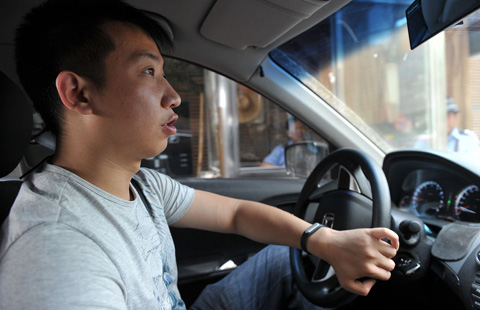
 A young part-time chauffeur on the road
A young part-time chauffeur on the road
 Death toll from heat wave in India nears 800
Death toll from heat wave in India nears 800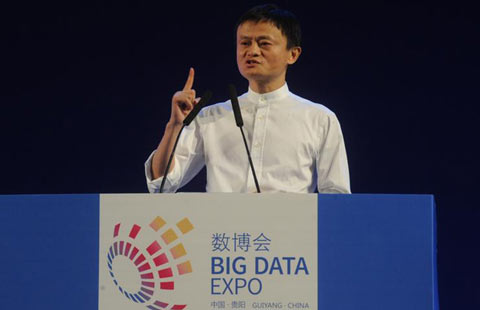
 Tech giants shine on Intl Big Data Expo 2015
Tech giants shine on Intl Big Data Expo 2015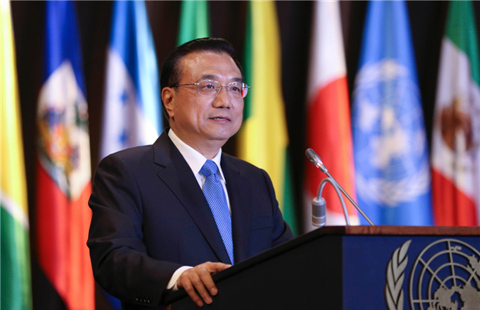
 Premier Li urges production capacity co-op between China, LatAm
Premier Li urges production capacity co-op between China, LatAm
 US honors war dead on Memorial Day
US honors war dead on Memorial Day
Most Viewed
Editor's Picks

|

|

|

|

|

|
Today's Top News
China cautions US over
South China Sea
China, Cuba emphasize confidence
Storms kill 16 in Texas, Oklahoma; Houston flooded
Obama to host South Korea's Park in mid-June
California oil spill takes toll on marine mammals
China issues first white paper on military strategy
China, Chile ink multi-billion-USD currency swap deal
Cleveland, US Justice Dept reach settlement over police
US Weekly

|

|
